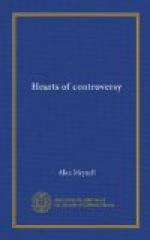And the meaner office of protection against reviewers and the world was doubtless done by the meaner Latinity. The author of the phrase “The child contracted a partiality for his toys” had no need to fear any authors she might meet at dinner. Against Charlotte Bronte’s sorrows her worse manner of English never stands for a moment. Those vain phrases fall from before her face and her bared heart. To the heart, to the heart she took the shafts of her griefs. She tells them therefore as she suffered them, vitally and mortally. “A great change approached. Affliction came in that shape which to anticipate is dread; to look back on, grief. My sister Emily first declined. Never in all her life had she lingered over any task that lay before her, and she did not linger now. She made haste to leave us.” “I remembered where the three were laid—in what narrow, dark dwellings.” “Do you know this place? No, you never saw it; but you recognize the nature of these trees, this foliage—the cypress, the willow, the yew. Stone crosses like these are not unfamiliar to you, nor are these dim garlands of everlasting flowers. Here is the place.” “Then the watcher approaches the patient’s pillow, and sees a new and strange moulding of the familiar features, feels at once that the insufferable moment draws nigh.” In the same passage comes another single word of genius, “the sound that so wastes our strength.” And, fine as “wastes,” is the “wronged” of another sentence—“some wronged and fettered wild beast or bird.”
It is easy to gather such words, more difficult to separate the best from such a mingled page as that on “Imagination”: “A spirit, softer and better than human reason, had descended with quiet flight to the waste”; and “My hunger has this good angel appeased with food sweet and strange”; and “This daughter of Heaven remembered me to-night; she saw me weep, and she came with comfort; ‘Sleep,’ she said, ’sleep sweetly—I gild thy dreams.’” “Was this feeling dead? I do not know, but it was buried. Sometimes I thought the tomb unquiet.”
Perhaps the most “eloquent” pages are unluckily those wherein we miss the friction—friction of water to the oar, friction of air to the pinion—friction that sensibly proves the use, the buoyancy, the act of language. Sometimes an easy eloquence resembles the easy labours of the daughters of Danaus. To draw water in a sieve is an easy art, rapid and relaxed.




